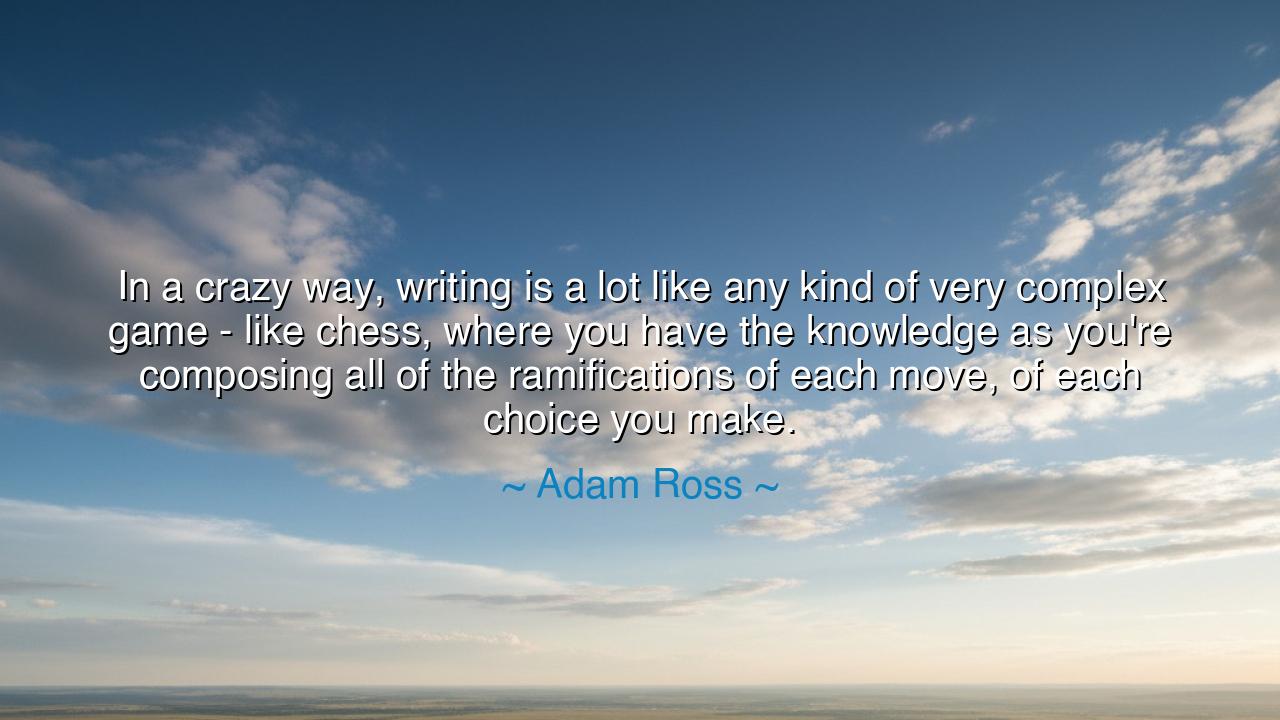
In a crazy way, writing is a lot like any kind of very complex
In a crazy way, writing is a lot like any kind of very complex game - like chess, where you have the knowledge as you're composing all of the ramifications of each move, of each choice you make.






“In a crazy way, writing is a lot like any kind of very complex game — like chess, where you have the knowledge as you’re composing all of the ramifications of each move, of each choice you make.” — Adam Ross
In the realm of human thought, where imagination and intellect meet, there lies the sacred art of writing — a craft not unlike the grand game of chess, where each move shapes the destiny of the board. So spoke Adam Ross, in a moment of rare insight, likening the act of composition to the strategies of kings and pawns. His words pierce to the heart of creation itself: that to write is to foresee, to balance, to risk — to hold in one’s mind the unfolding of countless possibilities, and yet to move forward with courage. For the writer, like the chess master, is both architect and prophet, weaving meaning from choice, consequence, and chaos.
In ancient times, philosophers often said that man is a creature of logos — of reason and of word. The word is our move upon the world’s board, our instrument of shaping reality. Thus, when a writer writes, they play not against an opponent, but against the limits of their own mind. Every sentence, every phrase, carries the weight of unseen futures: shift one word, and the tone changes; alter one image, and the soul of the piece transforms. So it is in chess, where one careless advance can open the king to ruin. The true artist must therefore think as deeply as the strategist — not impulsively, but with the steady hand of one who foresees the ramifications of each move.
Consider the tale of Leo Tolstoy, who labored for years over War and Peace. His manuscript was his battlefield, his characters the soldiers upon it. Each decision — who would live, who would die, who would love, and who would fail — shaped the destiny of his world. He rewrote, revised, and returned, again and again, because he understood that every choice echoed through the grand design. Like a master of chess, he knew that one misjudged move could topple the harmony of the whole. His genius was not in inspiration alone, but in foresight, in the disciplined imagination that could see the consequences before they came.
This is the heart of Ross’s teaching: that writing is a living game of consequence, where knowledge and intuition must walk hand in hand. The novice writes with abandon, believing passion alone is enough. But the master writes with vision — aware that each stroke of the pen reshapes the future. To write well is to dwell in paradox: to create freely, yet to think strategically; to surrender to emotion, yet to remain aware of form. The writer must learn to see the invisible board upon which their ideas play out, and to move not in haste, but with purpose.
In this sense, writing is more than art — it is a mirror of life itself. For every decision we make, every word we speak, sets into motion a chain of unseen effects. A kind word can heal across generations; a careless one can wound beyond repair. Just as a writer must foresee the unfolding of their story, so too must the wise soul foresee the story they are writing with their days. To live well is to live like a thoughtful author — aware that our actions are lines in a greater narrative, and that meaning is built, not found.
History remembers those who mastered this inner game. Marcus Aurelius, emperor and philosopher, wrote his Meditations not for the world, but for himself — a record of moves made and lessons learned upon the chessboard of the soul. He considered his choices not in isolation, but in harmony with all that might follow. Each entry, each thought, was an act of balance — between impulse and reason, between self and duty. Through his writing, he learned to rule not only an empire, but his own heart. And thus, his legacy endures, for he played the game with wisdom, not pride.
Let this truth settle deeply within you: every word you write, every choice you make, every silence you keep — these are your moves upon the great board of existence. Writing, then, is not merely expression; it is training for life itself. It teaches patience, foresight, humility, and courage. So write as though the world depends on your sentence. Speak as though your words shape eternity. And live as though each action echoes beyond your knowing.
For the writer and the wise man are kin: both are architects of destiny, both know that mastery is not found in haste, but in awareness. And when your hand trembles above the next move — whether on paper or in life — remember the lesson of Adam Ross: see the whole board, sense the unseen future, and choose not in fear, but in understanding. For in the end, the beauty of both writing and living lies not in winning the game, but in playing it with purpose.






AAdministratorAdministrator
Welcome, honored guests. Please leave a comment, we will respond soon